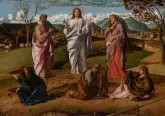Sunday Scripture: Let this mind be in you
September 25, 2011
By Sister Betty Jane Lillie, SC
Twenty-Sixth Sunday in Ordinary Time: Ezekiel 18:25-28; Psalm 25:4-9; Philippians 2:1-11; Matthew 21:28-32
In the last few weeks our Sunday readings have been considering some virtues of the Christian life. This life style has been set in the context of the shift from inherited or communal guilt to the concept of individual responsibility for one’s own actions.
This concept introduces the idea of a community of people in which each person is responsible for his own deeds, but in which all work together for the good of the whole community. This engenders a sense of mutual acceptance and support that allows for repentance and growth in love and service to God and neighbor.
Our reading this week from Paul’s Letter to his beloved Philippian community calls each person to look not only to his own interests but also to the interests of others as Christ did in taking the form of a servant and being born in human likeness. Thus Jesus died for us and won for us our redemption. He was given a name above all names and reigns in the glory of God the Father forever.
Some suggest that the text of the reading was really an early Christian hymn used by the communities to call them to unity in the communities and encourage a sense in each person of personally contributing to the well being of all. If it is true that a little further on in this letter he insinuates that a sense of petty jealousy and disagreement was causing divisions (Philippians 4:2), then his own example of service might inspire them to work together and to complete his joy even in spite of his imprisonment.
Our Gospel reading contains a parable that Matthew collected and placed in the last week of Jesus’ earthly career. It recalls the theme of a turnabout in moral decision making with one son at first declining his father’s request for help in working in the vineyard. Afterward the son repented and went. Thus, he did in fact do the will of his father. The other son agreed to work, but in fact did not do so.
Jesus used the turn of thought to make the point that events do no always end as one might expect them to. Here, those who were considered sinners in the society of the day would repent and enter the kingdom. Those in the religious establishment who might have been assumed to be the upright, often did not believe and turn to faith in the Lord (Matthew 21:31-32).
Now we can think back to Ezekiel and remember his preaching about the salvation of the wicked who turn away from wickedness and do what is lawful and right. They will surely be saved, whereas those who turn from righteousness to wickedness will be lost. Each one will be judged according to his ways. Then followed a word of the Lord that he preached and it was one of the most beautiful sayings of the oracle. “Get yourselves a new heart and a new spirit! Why will you die, O house of Israel? For I have no pleasure in the death of anyone, says the Lord; so turn, and live” (Ezekiel 18:31-32).
With the psalmist we can pray, “Make me know thy ways, O Lord; teach me thy paths. Lead me in thy truth and teach me, for thou art the God of my salvation” (Psalm 25).
Sister Betty Jane is faculty member at the Athenaeum of Ohio/Mount St. Mary’s Seminary.













